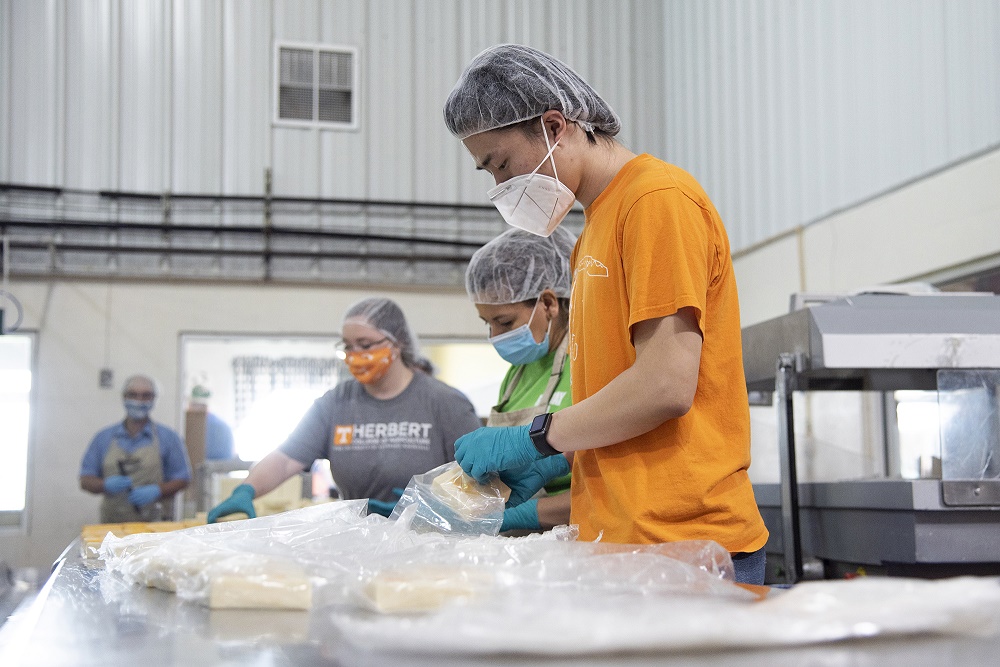
Tennessee, Kentucky and North Carolina Dairies to Benefit
KNOXVILLE, Tenn. — The University of Tennessee Center for Profitable Agriculture and Department of Animal Science are combining their expertise with experts from Kentucky and North Carolina to enhance the success of regional dairy businesses. The team, led by Liz Eckelkamp, the UT Extension dairy specialist, and Hal Pepper, a CPA financial specialist, has been awarded a $6 million grant from USDA Agricultural Marketing Service as part of the agency’s Diversifying Income and Adding Value by Manufacturing Dairy Products-Phase 2 efforts. Eckelkamp and Pepper were selected in October 2019 to lead the USDA-sponsored Tennessee Dairy Innovation effort to help Tennessee producers develop innovative dairy products, and this award is an extension of that work.
The new project will provide educational opportunities to help participants manage financial risk by evaluating opportunities to develop and market value-added products. Producers wanting to start or expand a dairy business in Tennessee, Kentucky, or North Carolina are the intended audience for services that include enterprise assessments, direct marketing workshops, business feasibility studies and more.
“The region’s dairy industry has really struggled in recent years, and the pandemic has led more consumers to look to local producers for food and dairy products. These producers want to better understand their costs so they will know whether developing creative products and fresh marketing ideas will improve their viability,” says Pepper. Eckelkamp, who works closely with Tennessee’s dairy farmers, adds, “The goal of this project is to help our dairy farmers understand the costs and potential benefits of starting a farmstead creamery. Through this subaward grant, we can also help relieve some of the financial burden that goes along with starting a new business.”
The three-year effort is expected to help regional producers evaluate their potential for value-added enterprises through these measured efforts:
• A benchmarking project to collect data from 60 southeastern dairy farms to establish average costs and efficiency measures and workshops to teach producers how to interpret and use the benchmark measures.
• Value-added enterprise assessments that will describe the current state of value-added dairy processors and serve as a baseline for future farm support efforts.
• Providing an annual value-added dairy conference for the duration of the project.
• Conducting a survey of Southeastern U.S. farmstead creameries.
The project is also expected to produce a number of educational materials including:
• A MarketReady curriculum developed by University of Kentucky for value-added dairy producers who want to wholesale dairy products and numerous workshops on topics such as direct marketing, business management, processing and production.
• State-specific education modules for Tennessee, Kentucky and North Carolina on regulatory, permitting and retail and wholesale marketing to be added to an existing course developed by Pennsylvania State University Extension, Introduction to Value-Added Dairy.
• Fact sheets and publications to aid dairy producers in making decisions about whether to add or expand a value-added dairy business.
Eckelkamp says producers may find the establishment of a regional value-added dairy processing web page and discussion group among the most valuable outcomes. “The web page and discussion group will be a community of practice for people and organizations helping small dairy processors thrive by access to a shared wealth of information and innovation. In our new virtual world, our web page can help dairy farmers across the country by connecting them with resources, potential costs, and access to the results from our creamery surveys.” She also says half the budget from this grant is earmarked to support local dairy businesses directly through competitive subawards. These subawards can be used for feasibility studies, marketing studies, processing trainings and to purchase dairy processing equipment.
Eckelkamp and Pepper will partner with Tim Woods and Jerry Pierce of the University of Kentucky, H. H. Barlow with the Kentucky Development Council, and Stephanie Ward with North Carolina State University, as well as other dairy industry supporters.
Rob Holland, director of the UT Center for Profitable Agriculture who is also currently serving as interim assistant dean of UT Extension, says the UT Institute of Agriculture is pleased to take the lead on this regional effort. “UT is well suited to lead this effort. For several years the Center for Profitable Agriculture has been working with Tennessee and regional producers to establish value-added businesses and products as a means to enhance farm income. Applying that expertise to the dairy industry is a win-win for everyone.”
“The UT Department of Animal Science is committed to helping producers enhance the profitability of their operations,” says Neal Schrick, professor and department head. “Dr. Eckelkamp’s knowledge of the dairy industry and of producer practices should help this effort provide much needed support as producers explore the value of adding an on-farm creamery to their business models.”
Through its land-grant mission of research, teaching and extension, the University of Tennessee Institute of Agriculture touches lives and provides Real. Life. Solutions. utia.tennessee.edu.